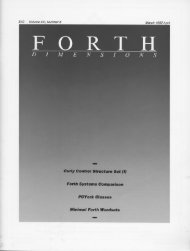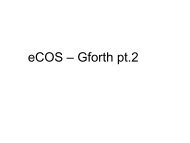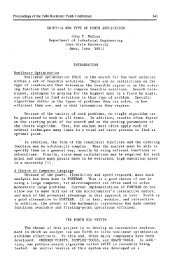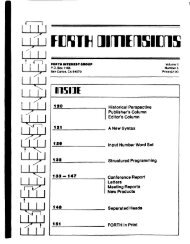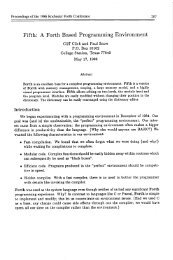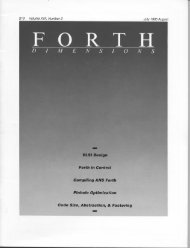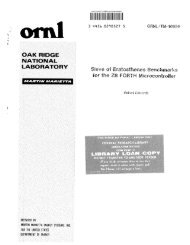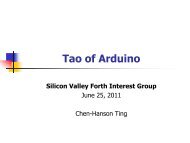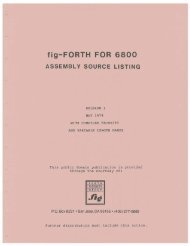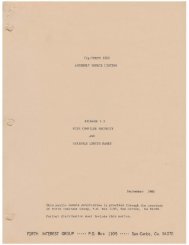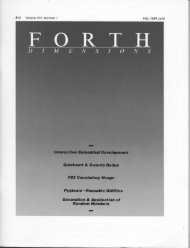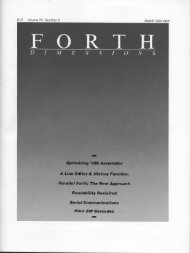5 - Forth Interest Group
5 - Forth Interest Group
5 - Forth Interest Group
You also want an ePaper? Increase the reach of your titles
YUMPU automatically turns print PDFs into web optimized ePapers that Google loves.
This is probably the main<br />
source of disagreement. It<br />
might stem from a difference<br />
in view of what the <strong>Forth</strong><br />
language is, has been, or<br />
could become. It might stem<br />
from a willingness to mde<br />
away capabilities of <strong>Forth</strong> to<br />
achieve harmony among<br />
vendors. It might stem from<br />
a disagreement aboutwhat it<br />
should be possible to do<br />
portably.<br />
My claim is that <strong>Forth</strong> has<br />
traditionally been a language<br />
which allows the user to build<br />
major language features.<br />
(There is a <strong>Forth</strong> literature<br />
discussing variant methods<br />
for doing local variables,<br />
exception handling, adding<br />
object orientation, etc.) <strong>Forth</strong><br />
has been a toolkit for build-<br />
ing application-oriented lan-<br />
guages. The ANSI team is<br />
heading in the direction of<br />
including some important<br />
features (local variables, ex-<br />
ception handling, etc.) but<br />
moving the ability to build<br />
such things.<br />
There are several other<br />
points of disagreement-<br />
most notably those having to<br />
do with clarity of definitions<br />
and simplicity of action.<br />
Words whose meanings can<br />
be interpreted differently by<br />
different irnplementors are<br />
useless for portable pro-<br />
gramming. The best tools<br />
available should be used to<br />
make the actions clear. Empty<br />
abstraction should be<br />
avoided-the actions of<br />
words should be as simple<br />
as possible. There are irnpor-<br />
tant aspects of the character<br />
of traditional <strong>Forth</strong> (simplic-<br />
ity, access, comprehensibil-<br />
ity, etc.) that should be pre-<br />
served.<br />
7bm is no disagreement<br />
at aU about describing Fotth<br />
wora3 in teyms of their be-<br />
havior. This is how <strong>Forth</strong><br />
words have always been<br />
described (On most systems,<br />
the lowest-level words have<br />
always been implemented<br />
in machine language, so it<br />
has never been possible to<br />
standardize their implemen-<br />
tation.)<br />
<strong>Forth</strong> Dimensions<br />
In this regard, I should<br />
mention that clarity of a de-<br />
scription of behavior is im-<br />
proved immensely if a glos-<br />
sary entry is accompanied<br />
by a sample definition. In the<br />
Golden Days of <strong>Forth</strong>, this<br />
was a way we old-timers<br />
found helpful to convey the<br />
intended behavior of a word<br />
I realize that the young folk<br />
have extreme prejudices<br />
against doing sensible things<br />
like this, so I'll just keep my<br />
mouth shut and rock on the<br />
porch here, looking through<br />
my old copies of BY7E<br />
magazine and generally<br />
basking in nostalgia!<br />
"Can't offhand think of<br />
any languages that describe<br />
how their data<br />
structures are arranged in<br />
memory, let along how<br />
their code is arranged in<br />
memory, which is what<br />
you seem to expect of<br />
<strong>Forth</strong>. ANS <strong>Forth</strong> pays a<br />
great deal of attention to<br />
describing data types, at<br />
least as dearly as C, etc. It<br />
also explicitly describes<br />
(Section 5.4 in BASIS, 3.4<br />
in dpANS-2) the regions<br />
of memory that are addressable<br />
by a standard<br />
program. Most high-level<br />
languages don't let you<br />
address memory at all. C<br />
sort of does, via '~oint-<br />
wages).<br />
I really have never under-<br />
stood arguments which pick<br />
some limitations that make<br />
other languages inflexible<br />
and use that to suggest that<br />
<strong>Forth</strong> should be equally in-<br />
flexible.<br />
From: John Wavrik<br />
Subjea: Nostalgia???!!???<br />
Elizabeth Rather writes,<br />
"Our discussion of deviations<br />
from the earliest days<br />
to the present is intended<br />
to point out that there has<br />
never been such a golden<br />
age, and that your nostalgia<br />
for it is, therefore. in-<br />
-<br />
( appropria&."<br />
Somehow, I feel like I am<br />
in the middle of the novel<br />
1984, in which the establish-<br />
ment had newspapers re-<br />
written to show that certain<br />
events never happened. Here<br />
is what I remember:<br />
When I became involved<br />
with <strong>Forth</strong>, most computer<br />
magazines had regular ar-<br />
ticles on the language. BYTE<br />
magazine devoted at least<br />
one full issue to <strong>Forth</strong> (per-<br />
haps more). Some magazines<br />
had a <strong>Forth</strong> column. My fmt<br />
course on <strong>Forth</strong> was taught<br />
(by request) to 30 faculty and<br />
staff members-including<br />
representatives from the<br />
seemed magically to run on<br />
others-and there was a<br />
healthy exchange of appli-<br />
cations and ideas. Magazine<br />
ads offered a variety of utili-<br />
ties (good editors, decompil-<br />
ers, etc.). You didn't have to<br />
juse your choice of <strong>Forth</strong>.<br />
I am really trying to be a<br />
good citizen-so I am trying<br />
to believe with all my might<br />
that this never happened (but<br />
if it didn't, then why do I<br />
have on the wall of my office<br />
a poster of the BYE maga-<br />
zine cover featuring <strong>Forth</strong>?).<br />
We are losing sight of the<br />
purpose of introducing this.<br />
The way <strong>Forth</strong> is described<br />
in the most popular texts<br />
was quite common-which<br />
is why the texts described it<br />
as they did. One must re-<br />
member that, if one is writ-<br />
ing a general textbook for a<br />
language (rather than a<br />
manual for a particular dia-<br />
lect), it is best to stick to<br />
common practice. I have<br />
chosen the name Traditional<br />
<strong>Forth</strong> for this language be-<br />
cause it is the form in which<br />
<strong>Forth</strong> was realized in a great<br />
many systems, from the ear-<br />
liest times to the present.<br />
Please note that there is<br />
nothing in the previous<br />
paragraphs that says there<br />
were no variant systems.<br />
There is nothing in the previ-<br />
ers,'but poinkrs are still a<br />
lot more abstract than ANSI is headed toward<br />
<strong>Forth</strong>'s addresses."<br />
Conventional languages<br />
including some important<br />
features, but removing the<br />
ability to build SUC~ I allow data structures only to<br />
be created by a limited set of<br />
mechanisms built into the<br />
languageand then impose<br />
furtherlim~tati~ns on thesta-<br />
tus of these structures (how<br />
they be passed to fUnc-<br />
tion% howoperatorsma~act<br />
On them, etc.1. is one<br />
the ~asons for using <strong>Forth</strong>-<br />
Obviousl~, someone<br />
must decide how a data<br />
structure is arranged in<br />
memory~ how it is accessed,<br />
' etc. In ~on~entio~al lan-<br />
Wages$ it is the designer<br />
thelanguage-In<strong>Forth</strong>~ itcan<br />
be the (who in a real<br />
sense, the &signer of Ian-<br />
com pu te r center , who<br />
wanted to be able to support<br />
the hot new language. <strong>Forth</strong><br />
was the official language of<br />
astronomy, and the Center<br />
for Astrophysia and Space<br />
Studies (CASS) was one of<br />
the main groups using it at<br />
UCSD. Several people at<br />
Scripps Institute of Ocean-<br />
ography also used the lan-<br />
guage. I regularly received<br />
requests about where to ob-<br />
tain an implementation of<br />
the language. Applications<br />
written for one platform<br />
things ...<br />
ous paragraphs that casts<br />
aspersions on the use of a<br />
non-standard system for cer-<br />
tain applications. There is<br />
nothing in the previous<br />
paragraphs that says that<br />
everything that has been<br />
done in the past in an at-<br />
tempt to standardize <strong>Forth</strong><br />
was done perfectly.<br />
I don't regard as nostalgia<br />
an effort to call attention to<br />
some extremely strong and<br />
positive things that were<br />
going on with the <strong>Forth</strong> lan-<br />
guage at that time.<br />
43 January 1992 February



